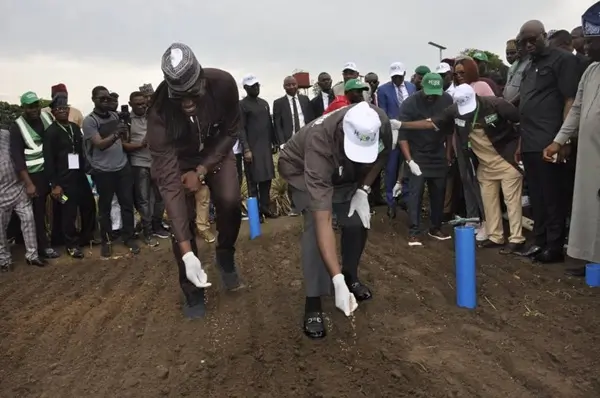In a move to shore up the nation’s food supply and invigorate rural livelihoods, the Federal Government has clinched a $134 million loan facility from the African Development Bank. Agriculture Minister Abubakar Kyari unveiled the funding at the 2024/2025 National Dry Season Farming launch in Calabar, pledging a new era of steady harvests and wider economic revival.
“This facility will jump-start our Dry Season Farming Programme,” Kyari told an audience of farmers and state officials. “By extending support to 250,000 wheat growers and 150,000 rice producers across all 37 states, we aim to harvest three-quarters of a million tonnes of wheat and nearly half a million tonnes of rice during this dry season alone.”
Under the National Agricultural Growth Support Scheme–Agro Pocket (NAGS-AP), the loan will fund subsidized fertilizers, improved seed varieties and extension services. The government has already backed more than 107,000 wheat growers and nearly 44,000 rice farmers in the 2023/2024 dry season, and supported 192,095 producers of staples such as maize, sorghum and cassava during the recent wet season.
Cross River—where yesterday’s launch took place—leads 16 other states in wheat cultivation, with over 3,000 farmers enlisted in this year’s drive. Kyari said the state’s partnership was a model for others: “Our collaboration here shows how federal and state efforts can combine to reduce reliance on imports and strengthen local food reserves.”
Beyond grains, the minister highlighted a ten-year, $1 billion mechanization initiative approved by the National Economic Council. The Greener Hope Agric Mechanization Consortium will roll out 1,000 agro-service centres, provide 2,000 tractors annually and engage some 600,000 youths in farm services over five years.
To cushion consumers, the government has also released 30,000 tonnes of milled rice at N40,000 per 50 kg bag and distributed 42,000 tonnes of strategic food-reserve grains to state emergency agencies. A new crop-fortification programme will enrich staples with vital micronutrients.
“Food security underpins all our economic ambitions,” Kyari said. “With these measures, we are planting the seeds of sustainable growth—and a future where no Nigerian goes hungry.”
By marrying fresh finance with home-grown enterprise, Nigeria’s agriculture sector is poised to deliver abundant harvests, steady incomes and leafy green promise for millions across the nation.

